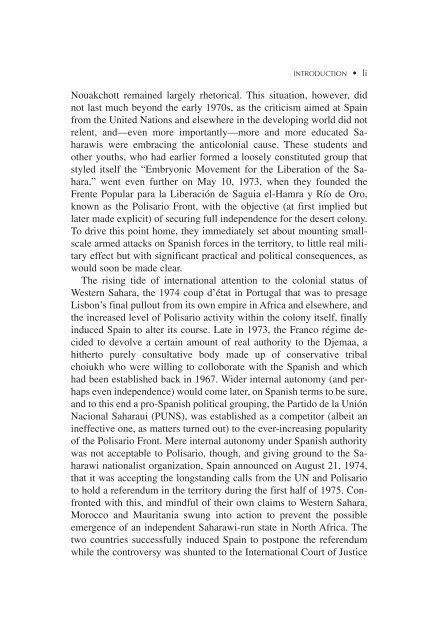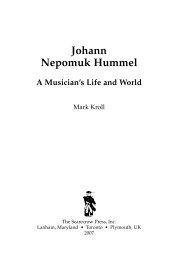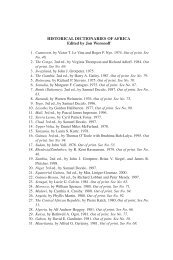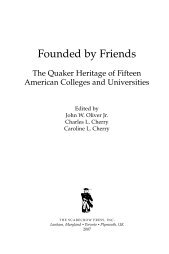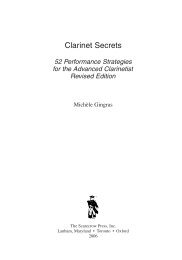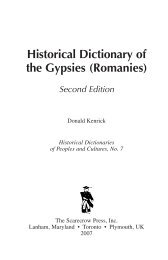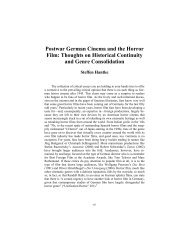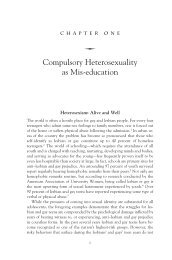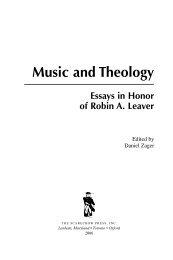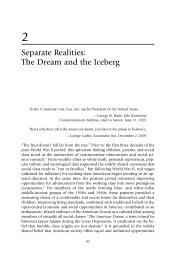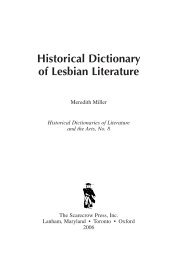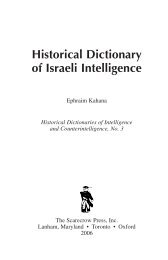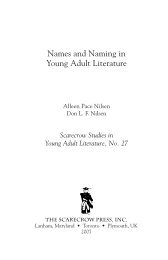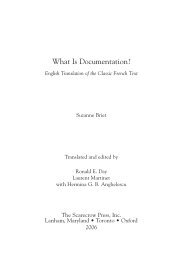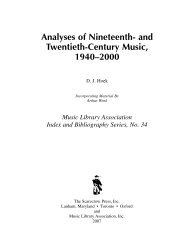Historical Dictionary of Western Sahara Third ... - Scarecrow Press
Historical Dictionary of Western Sahara Third ... - Scarecrow Press
Historical Dictionary of Western Sahara Third ... - Scarecrow Press
You also want an ePaper? Increase the reach of your titles
YUMPU automatically turns print PDFs into web optimized ePapers that Google loves.
INTRODUCTION • li<br />
Nouakchott remained largely rhetorical. This situation, however, did<br />
not last much beyond the early 1970s, as the criticism aimed at Spain<br />
from the United Nations and elsewhere in the developing world did not<br />
relent, and—even more importantly—more and more educated <strong>Sahara</strong>wis<br />
were embracing the anticolonial cause. These students and<br />
other youths, who had earlier formed a loosely constituted group that<br />
styled itself the “Embryonic Movement for the Liberation <strong>of</strong> the <strong>Sahara</strong>,”<br />
went even further on May 10, 1973, when they founded the<br />
Frente Popular para la Liberación de Saguia el-Hamra y Río de Oro,<br />
known as the Polisario Front, with the objective (at first implied but<br />
later made explicit) <strong>of</strong> securing full independence for the desert colony.<br />
To drive this point home, they immediately set about mounting smallscale<br />
armed attacks on Spanish forces in the territory, to little real military<br />
effect but with significant practical and political consequences, as<br />
would soon be made clear.<br />
The rising tide <strong>of</strong> international attention to the colonial status <strong>of</strong><br />
<strong>Western</strong> <strong>Sahara</strong>, the 1974 coup d’état in Portugal that was to presage<br />
Lisbon’s final pullout from its own empire in Africa and elsewhere, and<br />
the increased level <strong>of</strong> Polisario activity within the colony itself, finally<br />
induced Spain to alter its course. Late in 1973, the Franco régime decided<br />
to devolve a certain amount <strong>of</strong> real authority to the Djemaa, a<br />
hitherto purely consultative body made up <strong>of</strong> conservative tribal<br />
choiukh who were willing to colloborate with the Spanish and which<br />
had been established back in 1967. Wider internal autonomy (and perhaps<br />
even independence) would come later, on Spanish terms to be sure,<br />
and to this end a pro-Spanish political grouping, the Partido de la Unión<br />
Nacional <strong>Sahara</strong>ui (PUNS), was established as a competitor (albeit an<br />
ineffective one, as matters turned out) to the ever-increasing popularity<br />
<strong>of</strong> the Polisario Front. Mere internal autonomy under Spanish authority<br />
was not acceptable to Polisario, though, and giving ground to the <strong>Sahara</strong>wi<br />
nationalist organization, Spain announced on August 21, 1974,<br />
that it was accepting the longstanding calls from the UN and Polisario<br />
to hold a referendum in the territory during the first half <strong>of</strong> 1975. Confronted<br />
with this, and mindful <strong>of</strong> their own claims to <strong>Western</strong> <strong>Sahara</strong>,<br />
Morocco and Mauritania swung into action to prevent the possible<br />
emergence <strong>of</strong> an independent <strong>Sahara</strong>wi-run state in North Africa. The<br />
two countries successfully induced Spain to postpone the referendum<br />
while the controversy was shunted to the International Court <strong>of</strong> Justice


